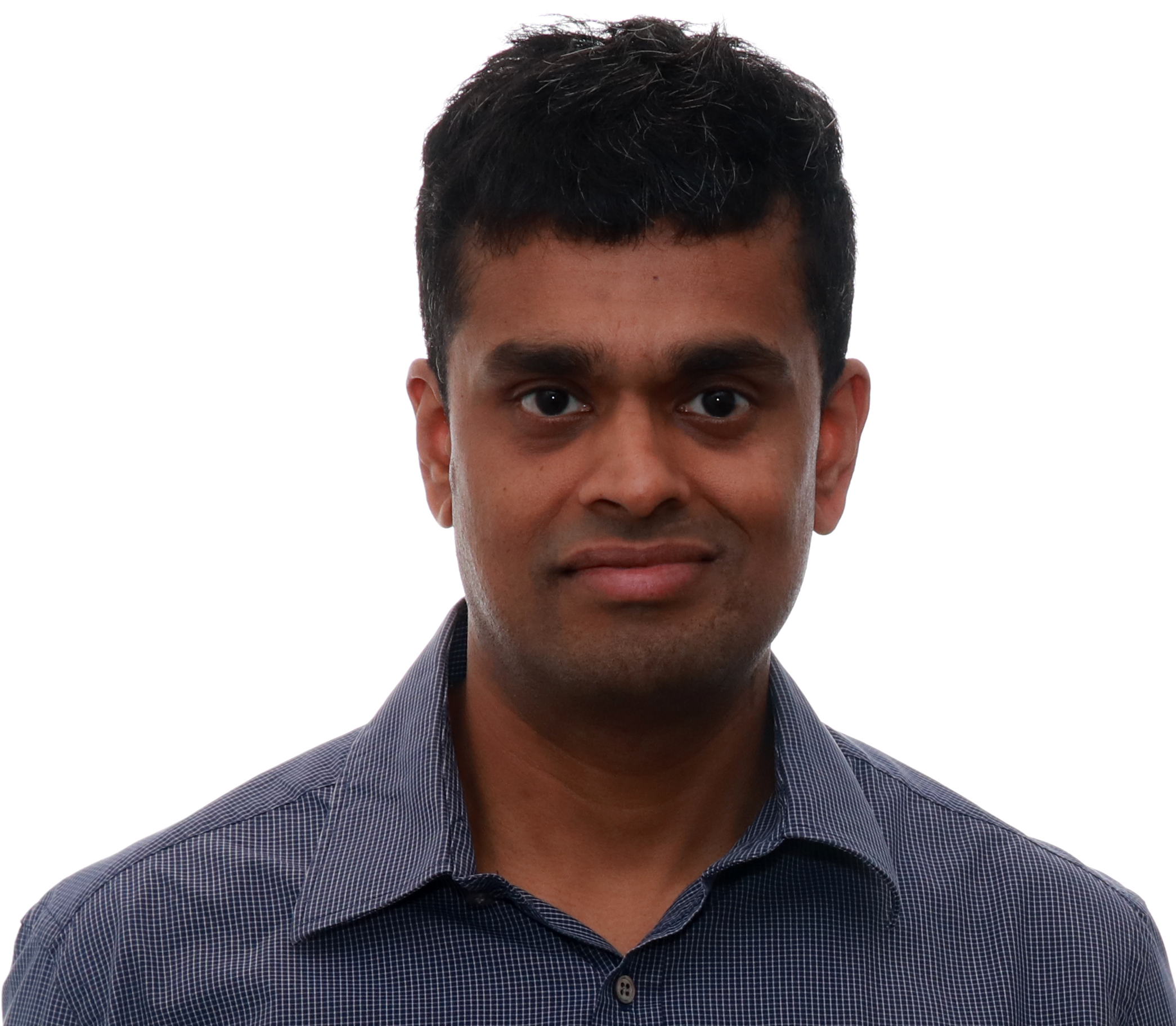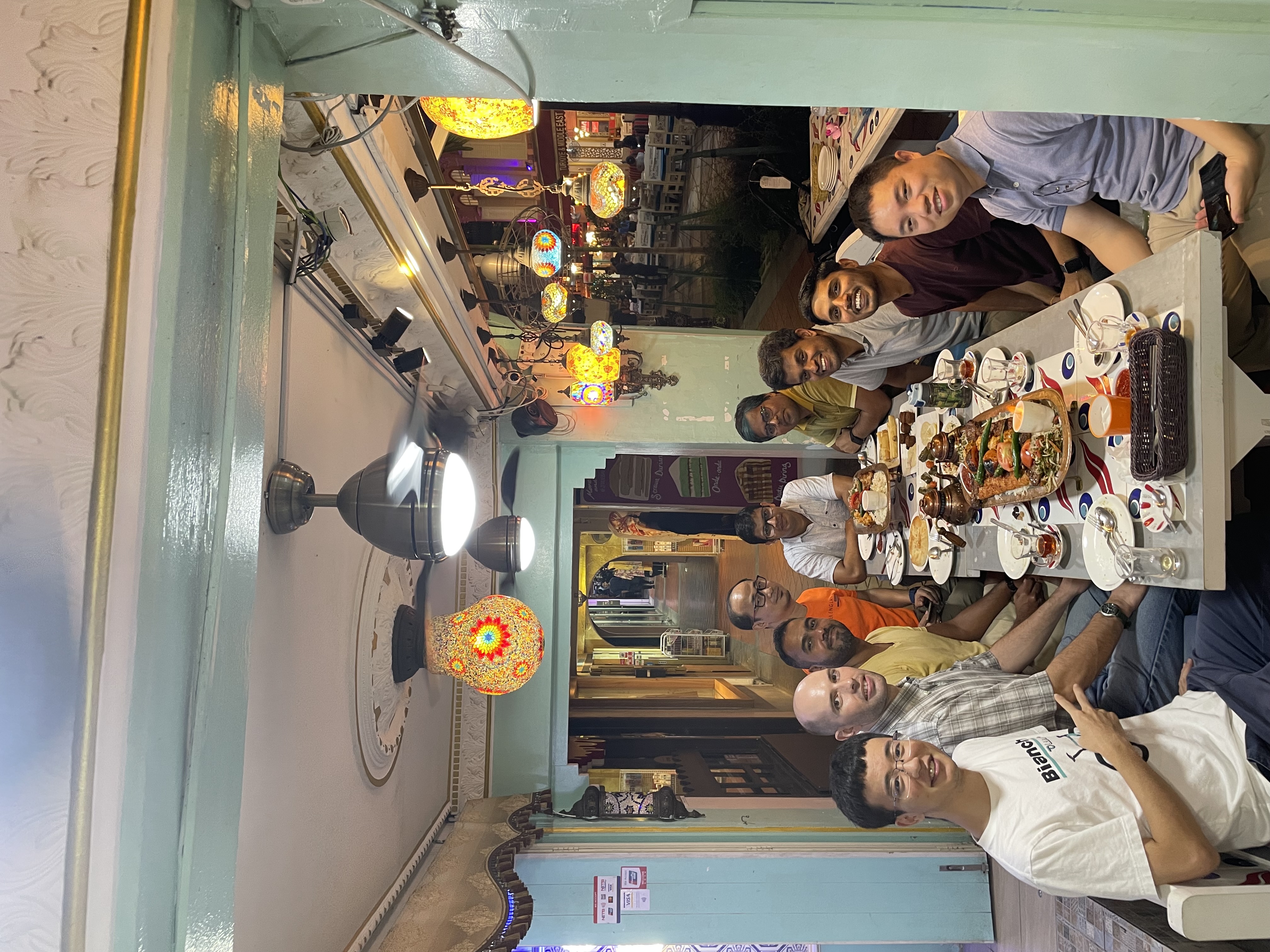Overview
Cyber-Physical Systems (CPS) encompass systems in which the cyber world of computation and communication closely interacts with the physical world of sensors and actuators. These are highly networked and deeply embedded systems such as those found in modern day aircrafts, automotives, factories, medical devices, smart phones, electric grids, etc. From driver-less cars and air traffic management using sense and avoid, to plug-and-play operating rooms and smart electric grids that integrate traditional and renewable energy sources, intelligent automation of an enormous scale is finding its way into many of these systems.
Primary interests of the CPS Research Group @CCDS,NTU are in the design and analysis of safety-critical and time-critical CPS, with a particular focus on cyber-resource management and safety assurance. The current research themes can be broadly classified as follows:
- Resource Management and Scheduling
- Safety Assurance in Learning Enabled Components
Ongoing Projects
Real-Time Scheduling of Deep Neural Network Workloads with Performance and Data Dependency
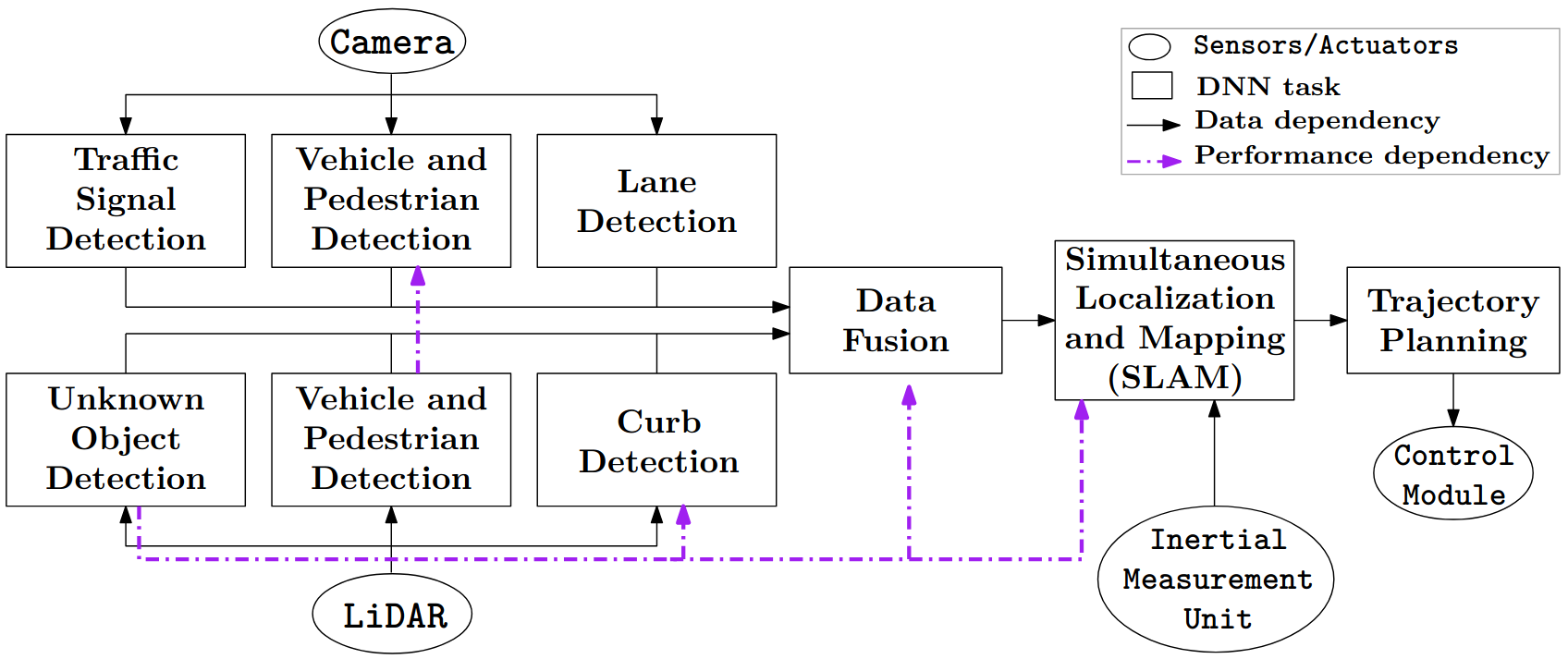 In modern CPS, pipelines of models are typically used, some of which can be implemented as deep neural networks (DNNs) while others can be implemented using classical algorithms. These pipelines allow for greater explainability and a more modular architecture that enables simpler DNNs to be trained on specific tasks and replaced as necessary. A pipeline is usually divided into planning, perception, and control stages, with data dependencies between the tasks. Additionally, given the result of one task, we may be able to predict the performance of another task; we call this a performance dependency. For example, in an autonomous driving application, if many vehicles are present, the performance of lane detection may suffer due to occlusion. This necessitates a scheduling plan that allocates more compute resources to the lane detection task to account for this challenging environment it faces. Thus, as one task makes predictions about the operating environment, the schedule of another performance dependent task may have to be dynamically adapted for efficiency purposes, while still meeting task deadlines.
In modern CPS, pipelines of models are typically used, some of which can be implemented as deep neural networks (DNNs) while others can be implemented using classical algorithms. These pipelines allow for greater explainability and a more modular architecture that enables simpler DNNs to be trained on specific tasks and replaced as necessary. A pipeline is usually divided into planning, perception, and control stages, with data dependencies between the tasks. Additionally, given the result of one task, we may be able to predict the performance of another task; we call this a performance dependency. For example, in an autonomous driving application, if many vehicles are present, the performance of lane detection may suffer due to occlusion. This necessitates a scheduling plan that allocates more compute resources to the lane detection task to account for this challenging environment it faces. Thus, as one task makes predictions about the operating environment, the schedule of another performance dependent task may have to be dynamically adapted for efficiency purposes, while still meeting task deadlines.
Tier-2 Research Grant (Ministry of Education, Singapore)
INSPIRASI: Charging Optimization for Electric Vehicle Fleets
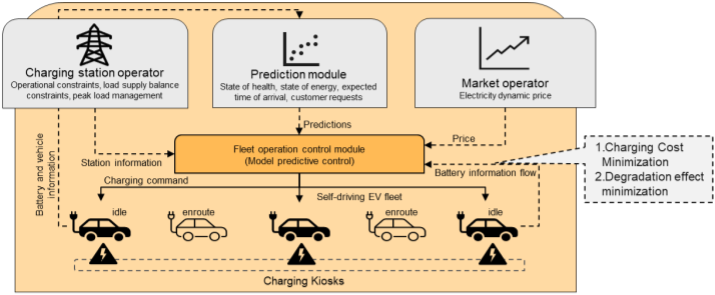 The transition towards electrified transportation systems presents significant challenges in managing Electric Vehicle (EV) fleet operations within constrained battery, energy, and infrastructure environments. This project proposes the development of hybrid algorithms that integrate machine learning models with mathematical optimization techniques to better optimize EV fleet charging strategies, while accurately modeling and considering battery degradation, grid limitations, and infrastructure availability. In addition, participation of EVs in Vehicle to Grid (V2G) operation will also be considered in making the charging decisions for the fleet. Concurrently, pricing and incentivizing mechanisms tailored for demand-responsive behaviors will be formulated, accommodating dynamic electricity pricing structures and demand response signals. The incorporation of pricing strategies in the proposed models further helps with taking informed decisions on charging during peak pricing hours, which ultimately reduces the overall charging cost. Finally, multi-factor predictive models will be developed to assess the influence of environmental, operational, and vehicular parameters - such as weather patterns, terrain topology, traffic dynamics, vehicle payloads, and battery conditions - on EV energy consumption and range prediction. Collectively, these solutions aim to achieve cost-effective, grid-compliant, and battery health-aware fleet management solutions. The outcomes are expected to substantially contribute to the design of resilient, efficient, and sustainable smart city mobility infrastructures.
The transition towards electrified transportation systems presents significant challenges in managing Electric Vehicle (EV) fleet operations within constrained battery, energy, and infrastructure environments. This project proposes the development of hybrid algorithms that integrate machine learning models with mathematical optimization techniques to better optimize EV fleet charging strategies, while accurately modeling and considering battery degradation, grid limitations, and infrastructure availability. In addition, participation of EVs in Vehicle to Grid (V2G) operation will also be considered in making the charging decisions for the fleet. Concurrently, pricing and incentivizing mechanisms tailored for demand-responsive behaviors will be formulated, accommodating dynamic electricity pricing structures and demand response signals. The incorporation of pricing strategies in the proposed models further helps with taking informed decisions on charging during peak pricing hours, which ultimately reduces the overall charging cost. Finally, multi-factor predictive models will be developed to assess the influence of environmental, operational, and vehicular parameters - such as weather patterns, terrain topology, traffic dynamics, vehicle payloads, and battery conditions - on EV energy consumption and range prediction. Collectively, these solutions aim to achieve cost-effective, grid-compliant, and battery health-aware fleet management solutions. The outcomes are expected to substantially contribute to the design of resilient, efficient, and sustainable smart city mobility infrastructures.
LPDP (Ministry of Education, Culture, Research, and Technology, Indonesia)
Allocation of Edge and Wireless Resources for Time-Sensitive Applications
 Cloud computing has become the default architecture of choice in many domains, primarily driven by the proliferation of compute-intensive Artificial Intelligence technologies. Orthogonally, with the increasing popularity of Internet-of-Things, decentralization of cloud computing in the form of edge and mobile computing is also happening. Although applications with time-critical functions have not yet been deployed on such architectures, this is rapidly changing with the advent of next-generation wireless technology like LoRa and 5G. For example, such applications can be found in manufacturing (real-time robotic controls), driving automation (localization using vehicle-to-infrastructure communication) and energy management (managing energy flexibilities in urban energy systems). In this project, we address the problem of resource (computation and communication) allocations in such architectures, considering a mixed deployment of time-critical as well as non time-critical applications, with the objective to minimize the energy consumption of low power end devices. We aim to solve the problem holistically taking into account all the relevant resources, and focus on decentralized online solutions with analytical performance guarantees.
Cloud computing has become the default architecture of choice in many domains, primarily driven by the proliferation of compute-intensive Artificial Intelligence technologies. Orthogonally, with the increasing popularity of Internet-of-Things, decentralization of cloud computing in the form of edge and mobile computing is also happening. Although applications with time-critical functions have not yet been deployed on such architectures, this is rapidly changing with the advent of next-generation wireless technology like LoRa and 5G. For example, such applications can be found in manufacturing (real-time robotic controls), driving automation (localization using vehicle-to-infrastructure communication) and energy management (managing energy flexibilities in urban energy systems). In this project, we address the problem of resource (computation and communication) allocations in such architectures, considering a mixed deployment of time-critical as well as non time-critical applications, with the objective to minimize the energy consumption of low power end devices. We aim to solve the problem holistically taking into account all the relevant resources, and focus on decentralized online solutions with analytical performance guarantees.
Tier-2 Research Grant (Ministry of Education, Singapore)
Open Source Project: mecRT (Mobile Edge Computing Simulator for Real-Time Applications)
DesCartes: Intelligent Modelling for Decision-making in Critical Urban Systems
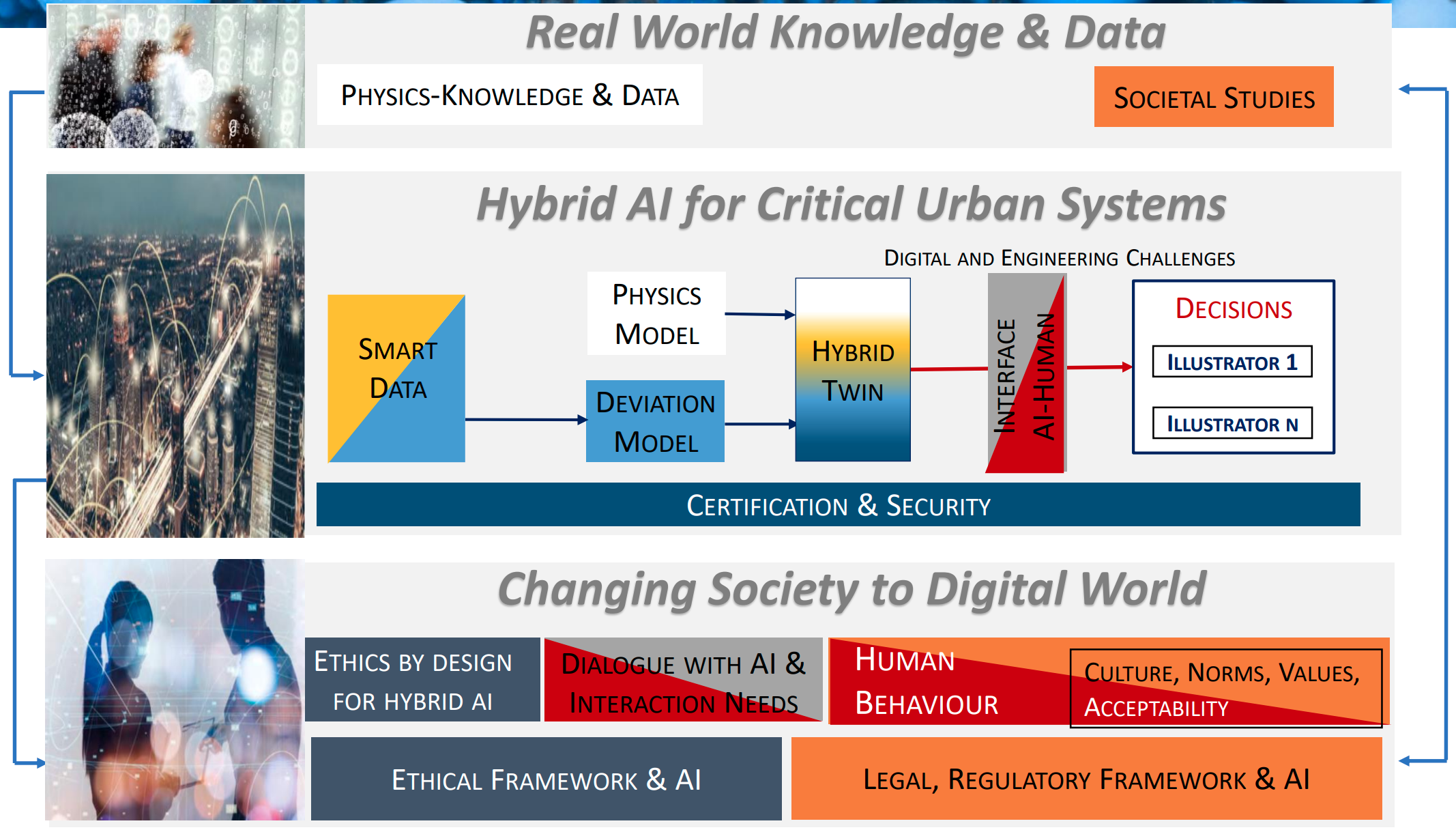 A new Hybrid Artificial Intelligence (HAI) program has been launched through an international collaboration involving the French National Centre for Scientific Research (CNRS), the Agency for Science, Technology and Research (A*STAR), Nanyang Technological University (NTU) and the National University of Singapore (NUS). This program will develop solutions that support the creation of “Smart Cities”, including development of hybrid AI methods that aim to enhance real-time decision-making in urban-critical systems, with a focus on individuals and society at large. It will also adopt a holistic and multidisciplinary approach that combines AI with existing subject-based models from physics and engineering.
A new Hybrid Artificial Intelligence (HAI) program has been launched through an international collaboration involving the French National Centre for Scientific Research (CNRS), the Agency for Science, Technology and Research (A*STAR), Nanyang Technological University (NTU) and the National University of Singapore (NUS). This program will develop solutions that support the creation of “Smart Cities”, including development of hybrid AI methods that aim to enhance real-time decision-making in urban-critical systems, with a focus on individuals and society at large. It will also adopt a holistic and multidisciplinary approach that combines AI with existing subject-based models from physics and engineering.
Within this large program, our research will focus on the “Augmented Hybrid Engineering” work package, that brings the engineering, technological, and application dimensions to the concept of HAI. It aims at proposing operational methodology and architecture, from smart sensing and predictive diagnostics to robust and scalable control, for critical and complex system-of-systems. This implies a multi-disciplinary consortium with complementary expertise between France and Singapore. The disruptive engineering developments, implementations and integrations performed in this work package will permit to reach the project final objectives in terms of relevant and reliable technologies that are fully integrated and validated on representative proofs-of-concept and real-life systems.
CNRS@CREATE (National Research Foundation, Singapore)
Program Overview (external link)
Read More (Augmented Hybrid Engineering)
Past Projects
Trust to Train and Train to Trust: Agent Training Programs for Safety-Critical Environments
 Over the last few years, Artificial Intelligence (AI) systems have achieved super-human performance in specific yet complex tasks across diverse environments (e.g., image recognition, language translation, complex games like Go). Given their effectiveness, we aim to employ AI (or Agent) Training Programs (ATPs) to generate scenarios automatically for training (on specific tasks) in safety-critical applications while addressing the issue of trust to improve adoption:
Over the last few years, Artificial Intelligence (AI) systems have achieved super-human performance in specific yet complex tasks across diverse environments (e.g., image recognition, language translation, complex games like Go). Given their effectiveness, we aim to employ AI (or Agent) Training Programs (ATPs) to generate scenarios automatically for training (on specific tasks) in safety-critical applications while addressing the issue of trust to improve adoption:
-
Trust to Train: Gain trust of organizations employing ATPs through guarantees on training outcomes (safety), equality in training for all trainees (fairness), and training for unexpected situations (robustness).
-
Train to Trust: Explainable (understandable) and effective feedback interface in training to gain trust of trainees.
We intend to develop and assess Explainable and tRustworthy (ExpeRt) ATPs with feedback interfaces to adaptively train human(s) for safety-critical applications with show-case projects on emergency response and maritime navigation. This project is a collaboration between faculty at Singapore Management University (SMU), National University of Singapore (NUS) and Nanyang Technological University (NTU). Within the trustworthiness assurance research track in the above project, in our research we will be exploring techniques for assessing the safety, robustness and fairness properties in deep reinforcement learning (dRL) frameworks used in the ATPs.
AI Singapore Research Programme (AI Singapore, Singapore)
Assured-Safety Architecture for Machine Learning based CPS
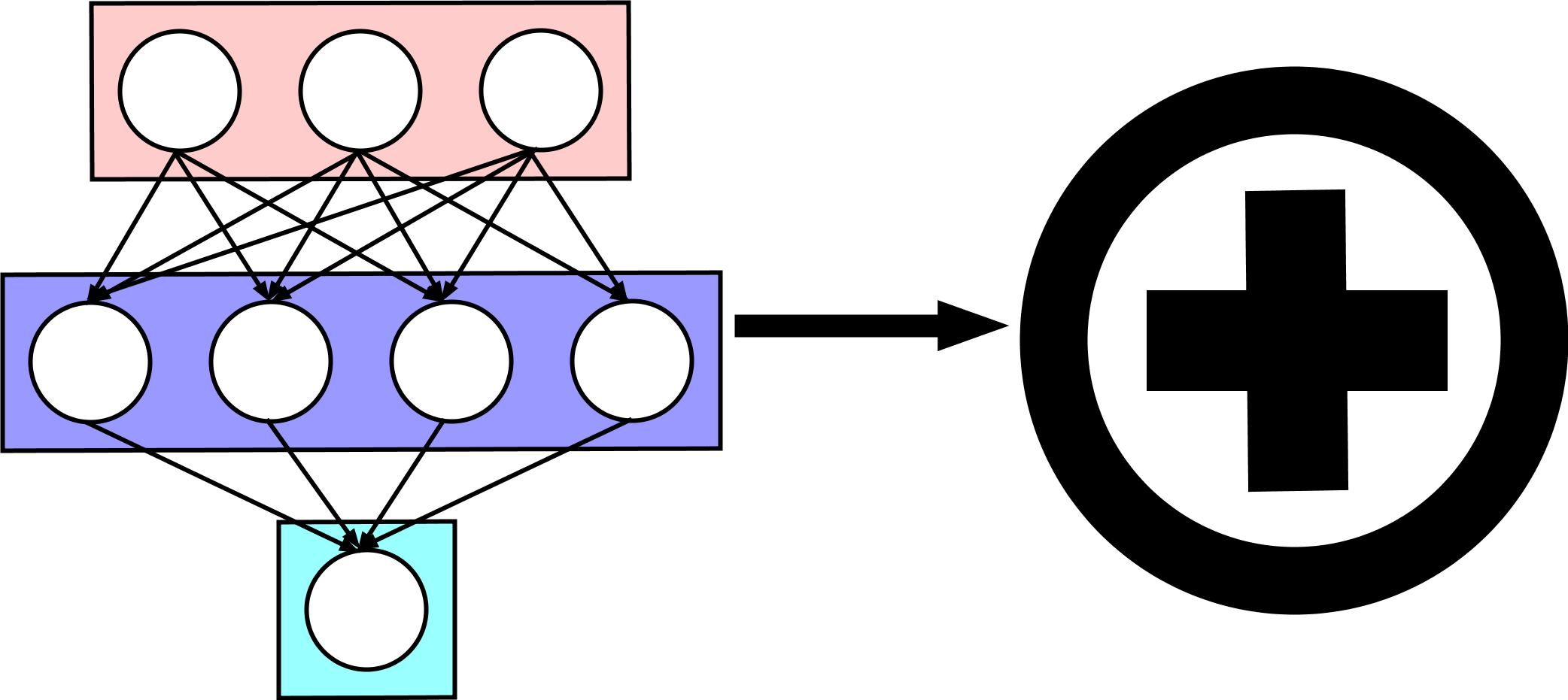 Machine learning (ML) techniques are increasingly applied to decision-making and control problems in CPS among which many are safety-critical, e.g., chemical plants, robotics, autonomous vehicles. Despite the significant benefits brought by ML techniques, there are various factors that can impede the achievement of ML safety. For example, 1) expressive ML models such as deep neural networks (DNN) are typically considered to be non-transparent, behaving as a “black-box” and lacking interpretable knowledge representation; 2) The empirical risk minimization approach used to train ML models reduces the probability of false prediction on the assumption that the training samples are drawn from the actual underlying probability distribution of the population; 3) Formal verification requires a specification of the property of interest, i.e., a precise, mathematical statement of what the system is supposed to or not supposed to do. However, it is difficult to come up with such a formal specification for ML-CPS. In this work, we focus on the design of novel techniques to improve the safety of ML-CPS. In particular, we develop online and robust detection techniques for Out-of-Distribution (OOD) data and Probably Approximately Correct (PAC) techniques for deriving probabilistic testing guarantees in ML-CPS.
Machine learning (ML) techniques are increasingly applied to decision-making and control problems in CPS among which many are safety-critical, e.g., chemical plants, robotics, autonomous vehicles. Despite the significant benefits brought by ML techniques, there are various factors that can impede the achievement of ML safety. For example, 1) expressive ML models such as deep neural networks (DNN) are typically considered to be non-transparent, behaving as a “black-box” and lacking interpretable knowledge representation; 2) The empirical risk minimization approach used to train ML models reduces the probability of false prediction on the assumption that the training samples are drawn from the actual underlying probability distribution of the population; 3) Formal verification requires a specification of the property of interest, i.e., a precise, mathematical statement of what the system is supposed to or not supposed to do. However, it is difficult to come up with such a formal specification for ML-CPS. In this work, we focus on the design of novel techniques to improve the safety of ML-CPS. In particular, we develop online and robust detection techniques for Out-of-Distribution (OOD) data and Probably Approximately Correct (PAC) techniques for deriving probabilistic testing guarantees in ML-CPS.
Tier-2 Grant (Ministry of Education, Singapore)
Delta-NTU Cyber-Physical Systems Corporate Lab (National Research Foundation, Singapore and Delta Electronics Inc.)
Urban Mobility Grand Challenge (ERI@N, NTU through Land Transport Authority and National Research Foundation, Singapore)
Operational Optimization for Energy Management Systems

In Singapore, the operation of buildings consumes about a third of total electricity, making them one of the largest consumers of primary energy. A significant portion of this energy is consumed by space cooling and dehumidification. Thus, the reduction and more efficient use of energy in buildings will provide a large leverage for climate change mitigation. Orthogonally, given its geographical constraints, access to renewable sources of energy such as solar and wind will be minimal relative to its needs. Hence a significant focus is also expected on the electrification of its automotive fleet to reduce reliance on traditional sources of energy. In this work, we develop IoT methodologies and optimization frameworks for decentralized monitoring of energy use in urban environments as well as for the operational optimization of such interconnected and complex energy systems.
Industrial PhD Grant (Economic Development Board, Singapore and Veolia City Modelling Center)
PhD Grant (ERI@N, NTU)
Intra-CREATE Seed Grant (National Research Foundation, Singapore and TU Munich)
Model-in-the-Loop Framework for Manufacturing
 With sensing technology becoming pervasive in manufacturing plants, large amounts of data are being generated in real-time. As a consequence, there is a need to effectively utilize this big data so that the desired objectives of Industry 4.0 such as predictive maintenance, root cause analysis and re-configurability, can be realized. The digital twin, obtained by using this big data together with plant and controller models, can be viewed as an accurate and time-synchronized characterization of the physical system in the cyber space. In this work, we aim to develop a tooling framework to realize the design and deployment of a digital twin in manufacturing with the following objectives: introducing a software architecture for the digital twin construction and application development, building a digital twin using heterogeneous modeling formalisms and online data integration, and providing a single source of truth for isolated applications via well-formed interfaces.
With sensing technology becoming pervasive in manufacturing plants, large amounts of data are being generated in real-time. As a consequence, there is a need to effectively utilize this big data so that the desired objectives of Industry 4.0 such as predictive maintenance, root cause analysis and re-configurability, can be realized. The digital twin, obtained by using this big data together with plant and controller models, can be viewed as an accurate and time-synchronized characterization of the physical system in the cyber space. In this work, we aim to develop a tooling framework to realize the design and deployment of a digital twin in manufacturing with the following objectives: introducing a software architecture for the digital twin construction and application development, building a digital twin using heterogeneous modeling formalisms and online data integration, and providing a single source of truth for isolated applications via well-formed interfaces.
Delta-NTU Cyber-Physical Systems Corporate Lab (National Research Foundation, Singapore and Delta Electronics Inc.)
Resilient Cyber-Infrastructure for Manufacturing
 Sensor proliferation and large-scale connectivity have enabled a variety of functionalities in CPS. However, connectivity also means that these systems operate in unreliable open environments, and hence resiliency to faults become important. This resiliency is fundamentally dependent on the resiliency of the cyber-infrastructure (communication network and computation nodes), which plays a central role of data delivery and execution of control. The objective of this work is to design a scalable and runtime-configurable resilience management framework for fault-handling in such emerging CPS. We also aim to demonstrate these capabilities through case studies in the application domain of smart manufacturing.
Sensor proliferation and large-scale connectivity have enabled a variety of functionalities in CPS. However, connectivity also means that these systems operate in unreliable open environments, and hence resiliency to faults become important. This resiliency is fundamentally dependent on the resiliency of the cyber-infrastructure (communication network and computation nodes), which plays a central role of data delivery and execution of control. The objective of this work is to design a scalable and runtime-configurable resilience management framework for fault-handling in such emerging CPS. We also aim to demonstrate these capabilities through case studies in the application domain of smart manufacturing.
Delta-NTU Cyber-Physical Systems Corporate Lab (National Research Foundation, Singapore and Delta Electronics Inc.)
Mixed-Criticality Scheduling Algorithms
 With increasing functionality and automation in real-time systems, the computational demand is steadily increasing, while resources available for servicing this demand are limited due to size, weight and power restrictions. As a result a module integration trend has emerged, so that many different applications are being cohosted on the same processing unit. Some of these applications are extremely critical for the correct behavior of the system (e.g., collision avoidance in automotive), while some others are relatively less critical (e.g., hill assist in automotive), thus giving rise to mixed-criticality real-time systems. In this work, we focus on the design of single-core as well as multi-core scheduling algorithms for such systems. We also develop practical workload models to characterize such systems, and evalute the same using an automotive testbed.
With increasing functionality and automation in real-time systems, the computational demand is steadily increasing, while resources available for servicing this demand are limited due to size, weight and power restrictions. As a result a module integration trend has emerged, so that many different applications are being cohosted on the same processing unit. Some of these applications are extremely critical for the correct behavior of the system (e.g., collision avoidance in automotive), while some others are relatively less critical (e.g., hill assist in automotive), thus giving rise to mixed-criticality real-time systems. In this work, we focus on the design of single-core as well as multi-core scheduling algorithms for such systems. We also develop practical workload models to characterize such systems, and evalute the same using an automotive testbed.
Tier-2 Grant (Ministry of Education, Singapore)
Cache Designs for Timing-Predictability
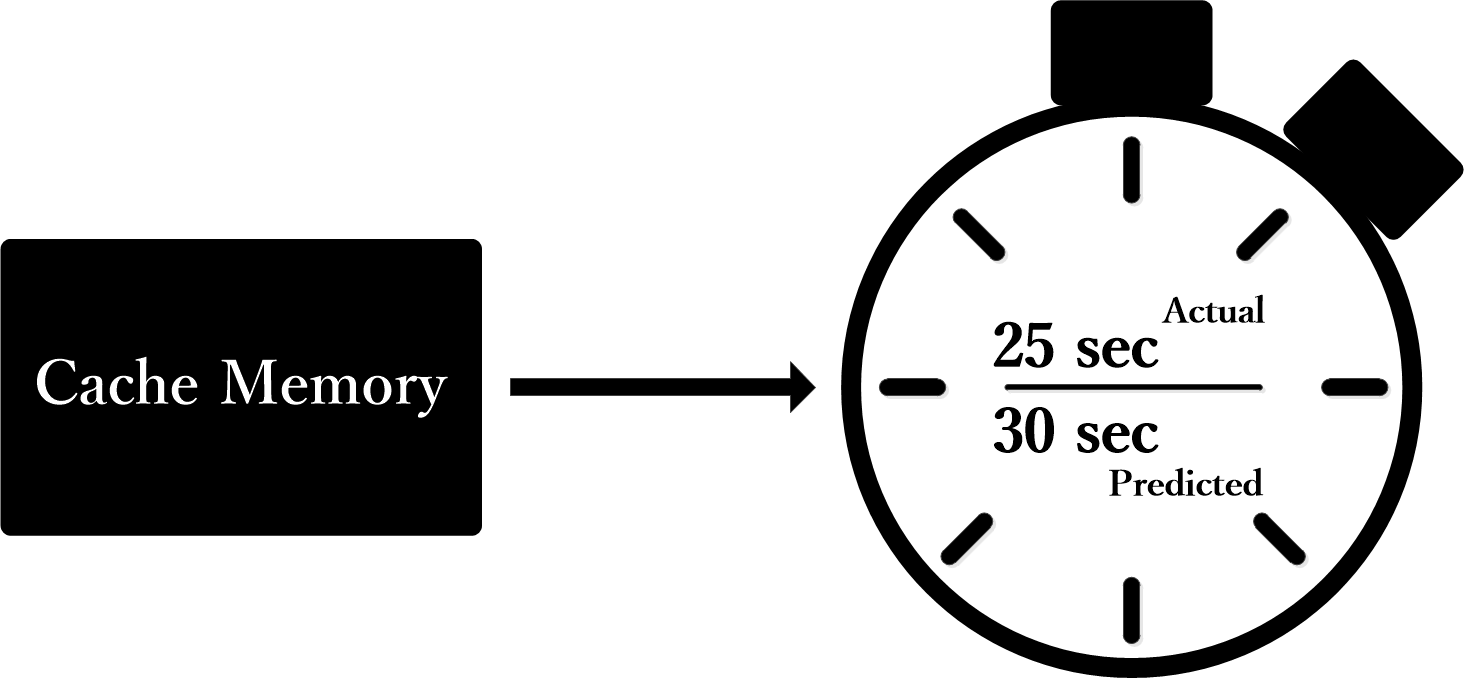 Cache memory plays a key role for performance improvement and energy efficiency in modern computer systems. However, when used as a shared resource in a multicore system, cache memory becomes the key source for timing unpredictability. As predictability is a major concern in real-time systems, this work designs cache memories to address this issue. We focus on the development of hardware techniques, including cache replacement policy designs, to improve the predictability of both private as well as shared caches on multicores.
Cache memory plays a key role for performance improvement and energy efficiency in modern computer systems. However, when used as a shared resource in a multicore system, cache memory becomes the key source for timing unpredictability. As predictability is a major concern in real-time systems, this work designs cache memories to address this issue. We focus on the development of hardware techniques, including cache replacement policy designs, to improve the predictability of both private as well as shared caches on multicores.
Tier-1 Grant (Ministry of Education, Singapore)

